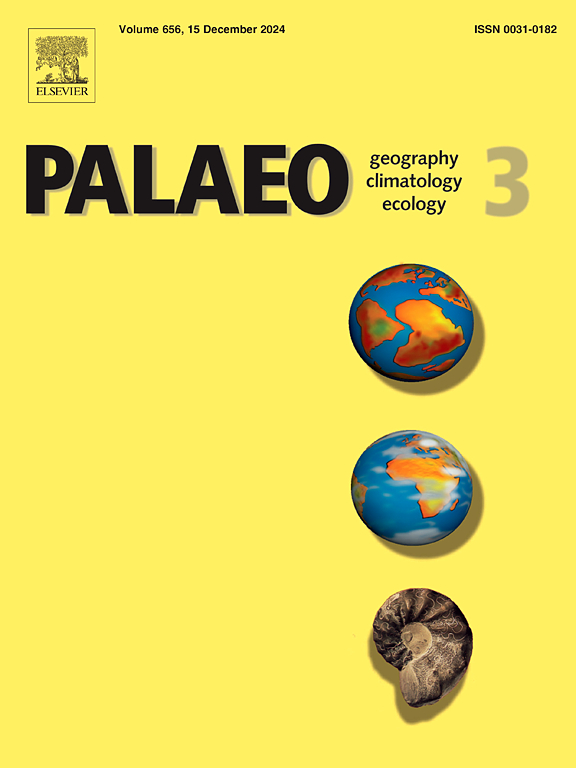南欧中更新世晚期一种已灭绝鹿科动物(Haploidoceros mediterraneus)的古生态学研究
IF 2.6
2区 地球科学
Q2 GEOGRAPHY, PHYSICAL
Palaeogeography, Palaeoclimatology, Palaeoecology
Pub Date : 2024-10-19
DOI:10.1016/j.palaeo.2024.112565
引用次数: 0
摘要
Haploidoceros mediterraneus是伊比利亚半岛(三个地点)和法国南部(两个地点)最近描述的特有种之一。与伊比利亚在中更新世期间出现的其他特有种相比,它的年代和地理范围更加广泛,表明其适应能力相对较强。然而,人们对 H. mediterraneus 的生态知之甚少。从遗址背景和动物关联来看,它在中更新世和晚更新世的栖息地与温和湿润的温带地中海或半大陆性气候下的疏林相符。首先,利用牙齿中层和微观磨损重建了它的饮食结构;其次,利用多成分分析法(MCA)分析了它随着时间的推移与其他鹿科动物的关系。饮食重建表明,在中更新世期间,它主要是以草食为主的混食动物。这种相对灵活的食性使它能够与一些鹿科动物(Cervus 和 Capreolus)共存,在特殊情况下也能通过资源分配与其它鹿科动物(Praedama/Megaloceros 和 Dama sp.)共存。在晚更新世,H. mediterraneus 转而以更多的草食为主。在这一时期,共同出现分析表明,H. mediterraneus的出现似乎排除了C. capreolus和D. dama的出现。H.mediterraneus的饮食习惯从中新世到晚更新世的演变可能导致其与其他专食草食的鹿科动物直接竞争,这可能是其灭绝的原因之一。本文章由计算机程序翻译,如有差异,请以英文原文为准。
Paleoecology of an extinct Cervidae (Haploidoceros mediterraneus) of the Middle-late Pleistocene in Southern Europe
Haploidoceros mediterraneus is one of the recently described cervid taxa endemic to the Iberian Peninsula (three sites) and southern France (two sites). Compared to the other endemic cervids from Iberia that have emerged, as well, during the mid-Middle Pleistocene, its chronological and geographical range are more expanded, indicative of a relative adaptative success. However, very little is known about H. mediterraneus ecology. From site contexts and faunal associations, its habitat during the Middle and Late Pleistocene corresponded to open forest under a mildly-humid temperate Mediterranean or semi-continental climate. First, its diet was reconstructed using dental meso- and microwear and second, its relationships with other cervids over time was analysed using Multiple Component Analysis (MCA). Diet reconstruction indicates that it was mostly a browse-dominated mixed-feeder during the Middle Pleistocene. Such a relatively flexible diet has allowed it to coexist, often with some cervid taxa (Cervus and Capreolus) and exceptionally with others (Praedama/Megaloceros and Dama sp.) by resource partitioning. During the Late Pleistocene, H. mediterraneus shifted toward a more browse-specialized diet. At this period, co-occurrence analyses show that the presence of H. mediterraneus seems to exclude that of C. capreolus and D. dama. The evolution of H. mediterraneus dietary habits from the Middle to the Late Pleistocene may have led to direct competition with other browsing-specialist cervids, which may be one of the causes of its extinction.
求助全文
通过发布文献求助,成功后即可免费获取论文全文。
去求助
来源期刊
CiteScore
5.90
自引率
10.00%
发文量
398
审稿时长
3.8 months
期刊介绍:
Palaeogeography, Palaeoclimatology, Palaeoecology is an international medium for the publication of high quality and multidisciplinary, original studies and comprehensive reviews in the field of palaeo-environmental geology. The journal aims at bringing together data with global implications from research in the many different disciplines involved in palaeo-environmental investigations.
By cutting across the boundaries of established sciences, it provides an interdisciplinary forum where issues of general interest can be discussed.

 求助内容:
求助内容: 应助结果提醒方式:
应助结果提醒方式:


